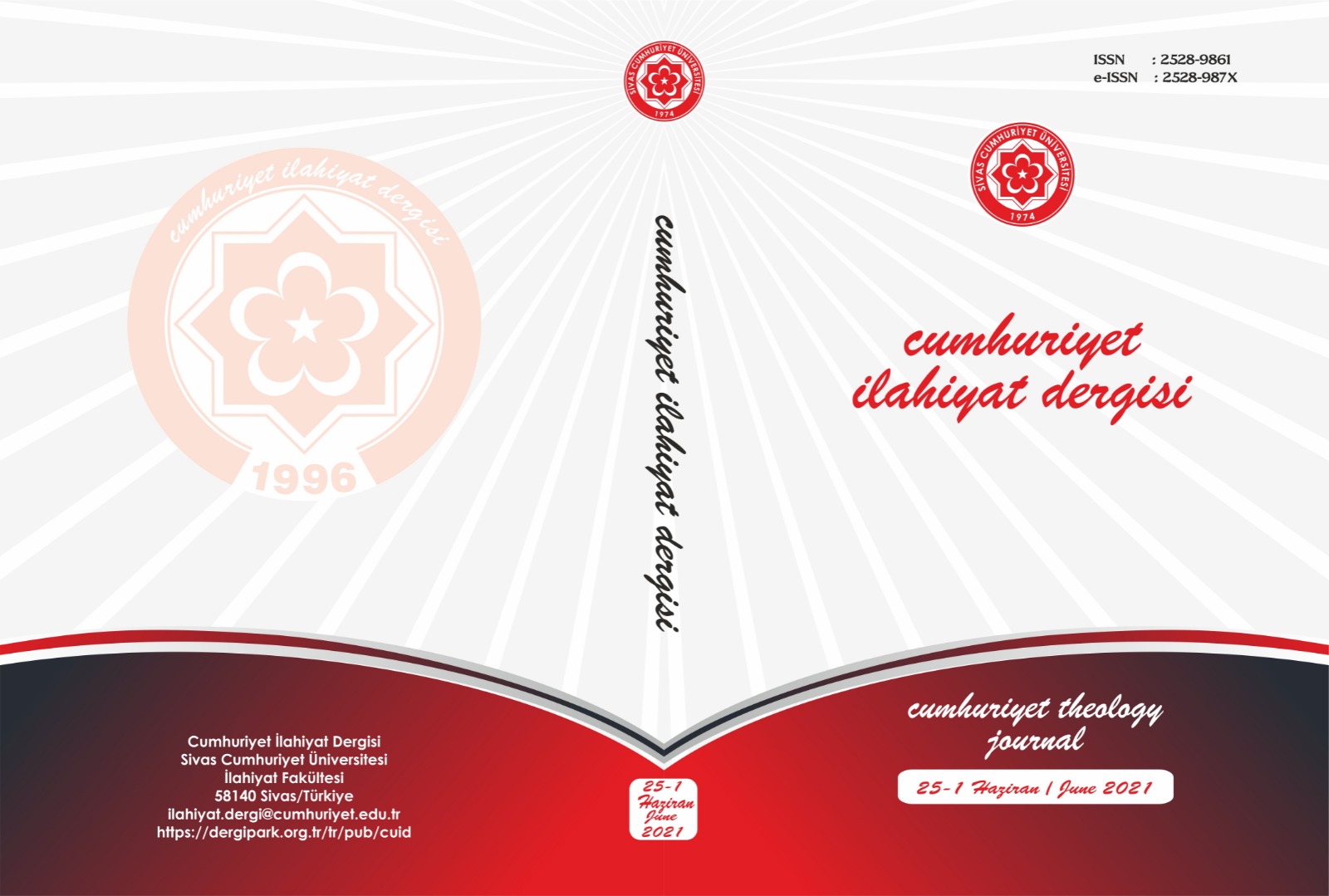İslâm Hukukunda Hz. Peygamber’in Fiillerinin Mubahlık (Hukukî Serbestlik) Bildirmesi
The Prophet Muḥammad’s Behavior Expressing Legal Freedom (Ibāḥā) in Islamic Law
Author(s): İbrahim YılmazSubject(s): Theology and Religion, Islam studies
Published by: Cumhuriyet Üniversitesi İlahyat Fakültesi
Keywords: Islamic Law, Sunnah; the Acts of the Prophet Muḥammad; Obligation; Legal Freedom; Mubāḥ; Ibāḥā;
Summary/Abstract: Sunnah is the second main source for Islamic law following the Qur’ān. Sunnah in the books on the Methodology of Islamic Law (Usūl al-fiqh) is examined in two main parts, one of which is as the source for religious commands and the other is being as religious/taklīfī commands. Sunnah is divided into three categories in terms of being the source for Islamic commands: qawlī (verbal), fi‘ilī (behavioral) and taqrīrī (approval). In the Islamic literature, when the word “sunnah” is mentioned, first of all, it is understood as a verbal appeal, which is qawlī sunnah (hadith). Verbal sunnah has a rhetoric/wording that includes demand (amr/order-nahy/prohibition) or freedom (mubāḥ). And ultimately to the wording of this verbal address, some religious commands, such as farḍ/wājib, sunnah/mandūb, and permissible/mubāḥ are attributed. The behavioral sunnah (the acts of the Prophet Muḥammad), on the other hand, does not have a rhetoric that includes demand (amr/order-nahy/prohibition) or freedom (mubāḥ). The command/judgment is based on rhetoric. In other words, if there is an address, there is a command; if there is no address, there is no command/judgment. Therefore, it is problematic that the acts of the Prophet are decreed in the form of farḍ/ wājib, sun-nah/mandūb and mubāḥ. For this reason, the acts of the Prophet in the books on the Method-ology of Islamic Law (Usūl al-fiqh) have been particularly examined under the title of Afʿāl al-Rasūl. While some of the acts of the Prophet Muḥammad have a religious character, some of them are the acts that he performed completely in accordance with the customs and traditions in the society he lived in. Therefore, not all of the Prophet’s deeds/acts (behavioral sunnah) are at the same level in terms of obligation. Therefore, while some of the acts/deeds of the Prophet express wucūb, some other mandūb (sunnah-mustaḥab) and still some other ibāhā/mubāḥ. On the other hand, the acts of the Prophet Muḥammad, in terms of being the source of religious commands, are divided into two categories: the tashrīī (religiously) qualified and non tashrīī (religiously) qualified. What is meant by a religious act is the actions of the Prophet, which he performed as being a prophet, for the purpose of worshiping and that he wanted his followers act accordingly. What is meant by a non-religious act is the behavior of the Prophet as a human being or as a requirement of the society he lived in. Sunnah, in terms of being a religious com-mand, refers to commands other than fard and wājib. Ḥanafī scholars are of the opinion that sunnah as a religious decree is divided into two parts as sunnah-i hudā and sunnah-i zawāid. The acts of the Prophet, in accordance with his being a human or the custom of the society he lived in, are included in the scope of sunnah zawāid. In other words, sunnah zawāid generally means the actions of the Prophet that he did not do with the intention of worship. In this con-text, the acts of the Prophet Muḥammad are important. Because, the acts of the Prophet are not the same in terms of qualification (command), nor are they the same in terms of their nature (being religious or humanly natural). The acts of the Prophet Muḥammad with a religious nature are divided into two as known qualities and unknown qualifications. In principle, the religious acts of the Prophet, whose qualities are known, are also obligation for the ummah (Muslims). Therefore, when it is known for what purpose the Prophet Muḥammad made a deed/behavior, that act is accordingly is binding for the ummah (Muslims). Accordingly, if the attribute of a deed/behavior made by the Prophet is wājib/farḍ, it is also wājib for the ummah and permissible (ibāḥā) for the ummah if it is permissible. On the other hand, the acts of the Prophet in the Qur’ān as a mujmal (ambiguous nass /verse) are also subject to the command of mujmal. There is a dispute regarding the verdict of the Prophet’s acts of religious nature whose qualifications are unknown. According to the majority of Hanafī scholars, what is essential in the actions of the Prophet whose qualifications are unknown and that contain the characteris-tics of worship, is that it is mustahab/mandūb. According to Kerkhī (d. 340/952), what is es-sential in such deeds/behaviors is that it is permissible. Jassās (d.370 / 980) expresses the same opinion with Kerkhī. Opinions on this issue are conveyed from Imām Mālik and Imām Shafiī that he declared permissibility. The preferred opinion in Hanbalis is to declare permissibility. Non-religious acts of the Prophet Muḥammad as a human being or as per the custom of the society he lives in are not obligation for the ummah. Therefore, what is essential in such deeds/behaviors is that it is permissible.
Journal: Cumhuriyet İlahiyat Dergisi
- Issue Year: 25/2021
- Issue No: 1
- Page Range: 275-292
- Page Count: 28
- Language: Turkish

